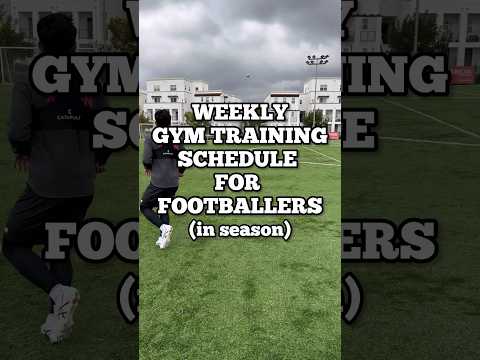Being a professional footballer isn’t just about dazzling footwork and scoring goals; it’s about discipline, hard work, and a well-structured footballer weekly schedule that keeps them at the top of their game. The life of a footballer is a grueling yet fascinating blend of intense training, strategic preparation, and personal development. So, let’s dive deep into the 7 key components that shape a footballer’s weekly grind and show you how you can apply these insights to your own journey in fitness and health.

7 Key Components of a Footballer Weekly Schedule
1. Daily Training Regimens
Footballers typically train around six days a week, squeezing in everything from strength exercises to tactical drills. Veteran players like Rúben Dias hit the ground running with two sessions on selected days, focusing on conditioning and set-piece execution. Their morning workouts often include a gym-based regimen, where they engage in strength training, cardio, and injury prevention.
The afternoon sessions are a different beast altogether. This is where the magic happens—passing drills, scrimmages, and tactical discussions reign supreme. When you’re looking to get shredded and increase muscle mass, following a structured training schedule like that of a footballer can help boost your gains.
2. Nutrition and Meal Plans
Nutrition is non-negotiable for footballers who want to perform at their peak. Just look at Lionel Messi, a living legend who strictly avoids refined sugars while loading up on lean proteins, fruits, and vegetables. It’s all about fueling your body right; many footballers use gamified apps like MyFitnessPal to track caloric intake—crucial for matching energy needs with their rigorous activities.
What can you learn here? Prioritize your diet just like a footballer does. Meal prep, plan your nutritional goals, and avoid the junk. Grabbing a quick burger might be tempting, but remember that what you eat serves as the cornerstone for your performance both in the gym and on the field.
3. Match Day Preparations
Come match day, a footballer’s preparations can vary widely. The excitement builds as players like Kevin De Bruyne engage in rituals that include visualization techniques. This isn’t just fluff; it sets the psychological stage for high performance. Pre-game meals are equally essential, often centered around complex carbohydrates and lean proteins to ensure that energy levels remain high through the competition.
So, how can you harness that energy in your own game? Focus on having a hearty, balanced meal before any physical activity. Make it a point to visualize your goals in the gym, fostering that winning mindset essential for making gains.
4. Media Engagement
In today’s world, athletes are not just players but public figures. Stars like Marcus Rashford spend hours a week engaging with fans and the media, balancing this with their training commitments. This part of their lives is significant. Media appearances and social media engagement can foster goodwill and enhance their brand, all while promoting charitable initiatives.
It’s essential to maintain a balance in your life, too. Just as footballers juggle their public personas, ensure you carve out time for passions beyond fitness. Engage in community events or social media outreach about topics you care about.
5. Physical Recovery Techniques
Recovery is as vital as training, and footballers are masters at it. Techniques like cryotherapy, massages, and active recovery sessions are essential for keeping bodies in prime condition. Players like Cristiano Ronaldo follow rigorous routines that emphasize sleep optimization, hydration, and nutrition post-training, ensuring they bounce back stronger.
You might wonder how to apply this to your training. Consider implementing rest days wisely. Get good sleep, stretch, or even consider spa days if it’s within your budget. Your body needs that TLC to keep smashing those fitness goals.
6. Tactical Review and Strategy Sessions
Analyzing gameplay forms a core component of a footballer’s schedule. Tech plays a major role here, with teams using tools like Hudl to dissect match footage. Players like Mohamed Salah put in extra hours understanding opponents, discussing tactics post-game with coaches to pinpoint areas for improvement.
Analyze your own performances, whether in the gym or during sports. Keep a training journal to observe trends in your progress. Reflect on what works, what doesn’t, and iterate on your strategy for success.
7. Personal Development and Education
Footballers often strive for personal growth alongside their sporting careers. Former Arsenal captain Thierry Henry personified this by completing management courses while in his playing years. The combination of sports and education gears athletes up for long-term success, whether in coaching or business.
Similarly, never stop learning. Whether it’s nutrition, exercise science, or general skills, invest time into self-education. Online platforms like FutureLearn enrich careers and lives well beyond the playing field.

Balancing Personal Life with Professional Commitments
An elite footballer’s schedule isn’t solely about sport; maintaining a balance of family time and relaxation is crucial for mental wellness. Players like Spanish midfielder Sergio Busquets have shared the value of nurturing family ties. Setting aside evenings for family dinners or quality time is essential for not just their happiness but also their performance on the pitch.
Mental health matters. Build a well-rounded life for yourself. Engage with family, friends, and hobbies outside the gym. This balance leads to a more fulfilling life, translating into better focus and results when you hit your training sessions.

The Role of Technology in a Footballer’s Weekly Schedule
Technology has infiltrated the world of sports, bringing wearables like GPS trackers and heart rate monitors into play. Clubs like Bayern Munich leverage these resources to personalize training loads and prevent injuries. Insights derived from data help fine-tune schedules, ensuring athletes remain in peak form.
Consider incorporating similar tech in your own workouts. Wearables can track your heart rate, calories burned, and workout intensity, offering precise feedback on your training.

Future Trends in Footballer Weekly Schedules
As the demands of sports continue to climb, the evolution of footballer schedules is inevitable. The future looks bright, with mental wellness sessions and personalized nutrition plans likely to take center stage. Clubs are beginning to invest in psychological experts to help players handle the pressures associated with high-stakes competition.
Your future also holds promise. As you refine your footballer weekly schedule, include elements that enhance not just physical strength but mental fortitude as well. Embrace the ongoing growth in fitness, nutrition, and wellness.
Taking a closer look at a footballer’s weekly schedule reveals the discipline and dedication required to succeed in professional sports. By balancing rigorous training, recovery, and personal life, players achieve peak performance while remaining passionate about their lives beyond the field.
Remember, you can apply these lessons to your own fitness journey. Draw inspiration from the daily rhythms of elite athletes and transform your routine. You’ll be amazed by how focusing on these components can lead you to get shredded, gain muscle, and achieve that ripped six-pack you’re after!

Footballer Weekly Schedule: Insights into a Pro’s Life
Behind the Scenes
Ever wonder what fills the day of a professional footballer? If you peek into a footballer weekly schedule, you’ll find it brimming with activities from dawn till dusk. Typically, a player starts their day early with team training sessions aimed at improving tactics and fitness. Interestingly, many pros swear by a solid breakfast—something hearty to fuel their bodies. Just like a football team builds chemistry on the field, players often form strong bonds off the pitch, reminding us of the camaraderie seen in shows like Up in the Air where relationships can make all the difference.
As part of their routine, recovery sessions play a huge role in a footballer’s week, and players often incorporate different techniques like massage and cryotherapy. Speaking of getting pampered, have you ever thought about how a vibe can change with the right gear? Picture a footballer busting out a stylish Columbia puffer jacket after a chilly training session, ensuring they stay warm and stylish while recovering between matches.
Game Day Excitement
Come match day, a footballer’s schedule gets even more intense. From pre-match meals to tactical briefings, every second counts. Fans might be interested to know that the atmosphere can feel electric—kind of like the buzz around major events or even new releases in cinemas, think about film releases like the Masters Of The Air release date generating excitement! Once the whistle blows, those players unleash all that training into a display of skill and teamwork that fans live for.
Now, let’s not forget about travel. When players hop on a bus or a flight headed to away games, it’s a chance to bond and strategize. This is akin to how frequent travelers share experiences, much like anyone would recount their hotel stays at cozy Vermont Resorts. These trips, whether short or long, come with their own set of challenges, especially when it involves managing time zones, which can leave players feeling a bit ‘up in the air’!
Post-Match Duties
After the final whistle blows, it’s back to business for these stars. The follow-up might include media duties, analysis sessions, and even community engagements. Did you know that many athletes dedicate time to understanding their finances too? Yep, while they might be raking it in, understanding concepts like closing costs For seller agreements can be pretty useful, especially for those looking to invest in their futures.
Overall, a footballer weekly schedule is packed with thrilling highs and demanding lows. Besides the fame and fanfare, it’s about discipline, teamwork, and personal growth. In the end, it’s not just about playing the game; it’s a lifestyle, one that invites comparisons to the lives of other professionals who navigate their own unique journeys, such as those behind Kickin’ It, where teamwork extends far beyond just sport!

What is a footballers training routine?
A footballer’s training routine usually consists of morning gym sessions focused on strength training, cardio, and injury prevention, followed by afternoon sessions that include drills, scrimmages, and tactical work.
Do Premier League players train every day?
Premier League players train almost every day, typically six days a week, with one day off dedicated to recovery.
How many hours a week do professional soccer players train?
Professional soccer players generally put in about 20 to 25 hours a week of training, which can include both gym work and on-field practice.
How many hours do footballers sleep?
Footballers typically aim for about 7 to 9 hours of sleep each night to recover and perform at their best, although some may also take short naps during the day.
What is Ronaldo’s training routine?
Ronaldo’s training routine is well-known for its intensity and includes high-volume strength training, cardio, skill drills, and a strict diet, plus plenty of recovery time, including sleep.
What is a footballers weekly wage?
Footballers in the Premier League earn, on average, just over £60,000 a week, which adds up to more than £3 million a year.
Is it good to train every day as a footballer?
Training every day can be beneficial for footballers, but it’s important they also have recovery time to prevent injuries and fatigue.
What time do football players wake up?
Most football players wake up early, often by 6 or 7 AM, to fit in their training and preparation for the day.
How many days a week does Arsenal train?
Arsenal, like most Premier League teams, trains six days a week, with a focus on preparation and recovery.
How long do professional football players practice a day?
Professional football players usually practice for about 4 to 6 hours a day, dividing their time between different types of training.
How much cardio do soccer players do?
Soccer players typically engage in cardio exercises several times a week, often incorporating running and other endurance activities into their routines.
Do Real Madrid players train every day?
Real Madrid players also train almost every day, following a routine similar to other top clubs, focusing on skill, fitness, and tactics.
Why does Ronaldo sleep 5 times a day?
Ronaldo sleeps five times a day to maximize his recovery and performance, as shorter, more frequent sleeps help enhance his focus and energy.
What is the best position for a footballer to sleep in?
The best sleeping position for a footballer is usually on their back or side to promote good circulation and keep the spine aligned.
Which athletes sleep a lot?
Many elite athletes, like swimmers and basketball players, prioritize sleep and might get more rest to aid recovery and performance.
How should a football player train?
Football players should train with a mix of strength, speed, agility, and endurance exercises to enhance their overall performance on the field.
How many hours a day do football players workout?
Most football players work out for about 2 to 4 hours a day, not including their recovery routines and proper nutrition.
What is a 3 day athlete workout split?
A 3-day athlete workout split typically includes focusing on different muscle groups each day—like upper body, lower body, and a day for agility and core strength—while allowing for recovery in between.
What is the best exercise for football players?
The best exercises for football players generally include sprinting drills, plyometrics, strength training for speed and agility, and functional movements to improve on-field performance.


























